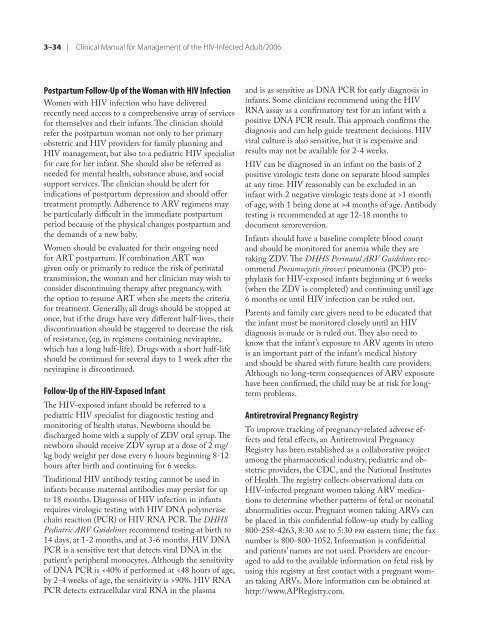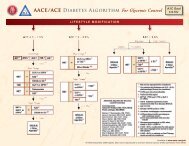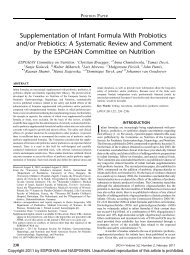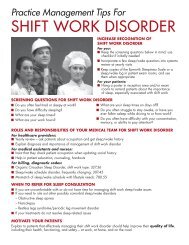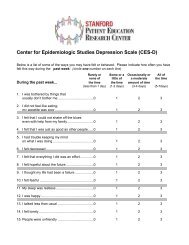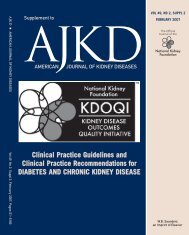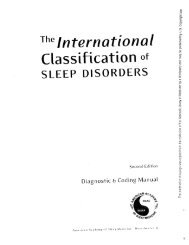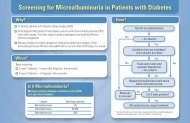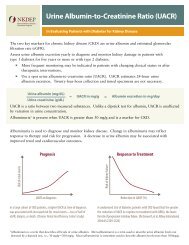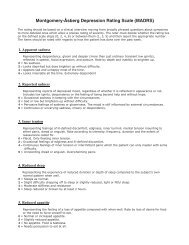Clinical Manual for Management of the HIV-Infected ... - myCME.com
Clinical Manual for Management of the HIV-Infected ... - myCME.com
Clinical Manual for Management of the HIV-Infected ... - myCME.com
You also want an ePaper? Increase the reach of your titles
YUMPU automatically turns print PDFs into web optimized ePapers that Google loves.
3–34 | <strong>Clinical</strong> <strong>Manual</strong> <strong>for</strong> <strong>Management</strong> <strong>of</strong> <strong>the</strong> <strong>HIV</strong>-<strong>Infected</strong> Adult/2006<br />
Postpartum Follow-Up <strong>of</strong> <strong>the</strong> Woman with <strong>HIV</strong> Infection<br />
Women with <strong>HIV</strong> infection who have delivered<br />
recently need access to a <strong>com</strong>prehensive array <strong>of</strong> services<br />
<strong>for</strong> <strong>the</strong>mselves and <strong>the</strong>ir infants. The clinician should<br />
refer <strong>the</strong> postpartum woman not only to her primary<br />
obstetric and <strong>HIV</strong> providers <strong>for</strong> family planning and<br />
<strong>HIV</strong> management, but also to a pediatric <strong>HIV</strong> specialist<br />
<strong>for</strong> care <strong>for</strong> her infant. She should also be referred as<br />
needed <strong>for</strong> mental health, substance abuse, and social<br />
support services. The clinician should be alert <strong>for</strong><br />
indications <strong>of</strong> postpartum depression and should <strong>of</strong>fer<br />
treatment promptly. Adherence to ARV regimens may<br />
be particularly difficult in <strong>the</strong> immediate postpartum<br />
period because <strong>of</strong> <strong>the</strong> physical changes postpartum and<br />
<strong>the</strong> demands <strong>of</strong> a new baby.<br />
Women should be evaluated <strong>for</strong> <strong>the</strong>ir ongoing need<br />
<strong>for</strong> ART postpartum. If <strong>com</strong>bination ART was<br />
given only or primarily to reduce <strong>the</strong> risk <strong>of</strong> perinatal<br />
transmission, <strong>the</strong> woman and her clinician may wish to<br />
consider discontinuing <strong>the</strong>rapy after pregnancy, with<br />
<strong>the</strong> option to resume ART when she meets <strong>the</strong> criteria<br />
<strong>for</strong> treatment. Generally, all drugs should be stopped at<br />
once, but if <strong>the</strong> drugs have very different half-lives, <strong>the</strong>ir<br />
discontinuation should be staggered to decrease <strong>the</strong> risk<br />
<strong>of</strong> resistance, (eg, in regimens containing nevirapine,<br />
which has a long half-life). Drugs with a short half-life<br />
should be continued <strong>for</strong> several days to 1 week after <strong>the</strong><br />
nevirapine is discontinued.<br />
Follow-Up <strong>of</strong> <strong>the</strong> <strong>HIV</strong>-Exposed Infant<br />
The <strong>HIV</strong>-exposed infant should be referred to a<br />
pediatric <strong>HIV</strong> specialist <strong>for</strong> diagnostic testing and<br />
monitoring <strong>of</strong> health status. Newborns should be<br />
discharged home with a supply <strong>of</strong> ZDV oral syrup. The<br />
newborn should receive ZDV syrup at a dose <strong>of</strong> 2 mg/<br />
kg body weight per dose every 6 hours beginning 8-12<br />
hours after birth and continuing <strong>for</strong> 6 weeks.<br />
Traditional <strong>HIV</strong> antibody testing cannot be used in<br />
infants because maternal antibodies may persist <strong>for</strong> up<br />
to 18 months. Diagnosis <strong>of</strong> <strong>HIV</strong> infection in infants<br />
requires virologic testing with <strong>HIV</strong> DNA polymerase<br />
chain reaction (PCR) or <strong>HIV</strong> RNA PCR. The DHHS<br />
Pediatric ARV Guidelines re<strong>com</strong>mend testing at birth to<br />
14 days, at 1-2 months, and at 3-6 months. <strong>HIV</strong> DNA<br />
PCR is a sensitive test that detects viral DNA in <strong>the</strong><br />
patient’s peripheral monocytes. Although <strong>the</strong> sensitivity<br />
<strong>of</strong> DNA PCR is 1 month<br />
<strong>of</strong> age, with 1 being done at >4 months <strong>of</strong> age. Antibody<br />
testing is re<strong>com</strong>mended at age 12-18 months to<br />
document seroreversion.<br />
Infants should have a baseline <strong>com</strong>plete blood count<br />
and should be monitored <strong>for</strong> anemia while <strong>the</strong>y are<br />
taking ZDV. The DHHS Perinatal ARV Guidelines re<strong>com</strong>mend<br />
Pneumocystis jiroveci pneumonia (PCP) prophylaxis<br />
<strong>for</strong> <strong>HIV</strong>-exposed infants beginning at 6 weeks<br />
(when <strong>the</strong> ZDV is <strong>com</strong>pleted) and continuing until age<br />
6 months or until <strong>HIV</strong> infection can be ruled out.<br />
Parents and family care givers need to be educated that<br />
<strong>the</strong> infant must be monitored closely until an <strong>HIV</strong><br />
diagnosis is made or is ruled out. They also need to<br />
know that <strong>the</strong> infant’s exposure to ARV agents in utero<br />
is an important part <strong>of</strong> <strong>the</strong> infant’s medical history<br />
and should be shared with future health care providers.<br />
Although no long-term consequences <strong>of</strong> ARV exposure<br />
have been confirmed, <strong>the</strong> child may be at risk <strong>for</strong> longterm<br />
problems.<br />
Antiretroviral Pregnancy Registry<br />
To improve tracking <strong>of</strong> pregnancy-related adverse effects<br />
and fetal effects, an Antiretroviral Pregnancy<br />
Registry has been established as a collaborative project<br />
among <strong>the</strong> pharmaceutical industry, pediatric and obstetric<br />
providers, <strong>the</strong> CDC, and <strong>the</strong> National Institutes<br />
<strong>of</strong> Health. The registry collects observational data on<br />
<strong>HIV</strong>-infected pregnant women taking ARV medications<br />
to determine whe<strong>the</strong>r patterns <strong>of</strong> fetal or neonatal<br />
abnormalities occur. Pregnant women taking ARVs can<br />
be placed in this confidential follow-up study by calling<br />
800-258-4263, 8:30 am to 5:30 pm eastern time; <strong>the</strong> fax<br />
number is 800-800-1052. In<strong>for</strong>mation is confidential<br />
and patients’ names are not used. Providers are encouraged<br />
to add to <strong>the</strong> available in<strong>for</strong>mation on fetal risk by<br />
using this registry at first contact with a pregnant woman<br />
taking ARVs. More in<strong>for</strong>mation can be obtained at<br />
http://www.APRegistry.<strong>com</strong>.


